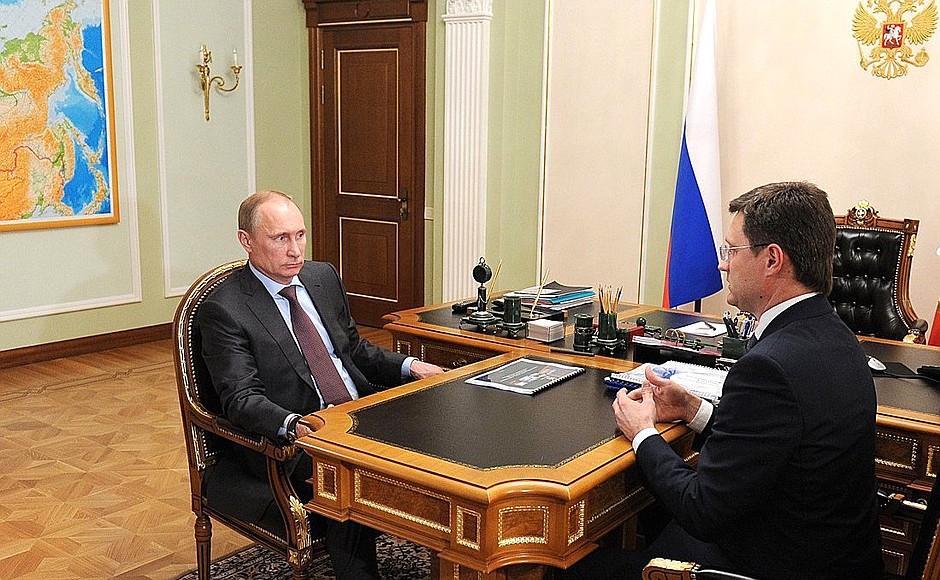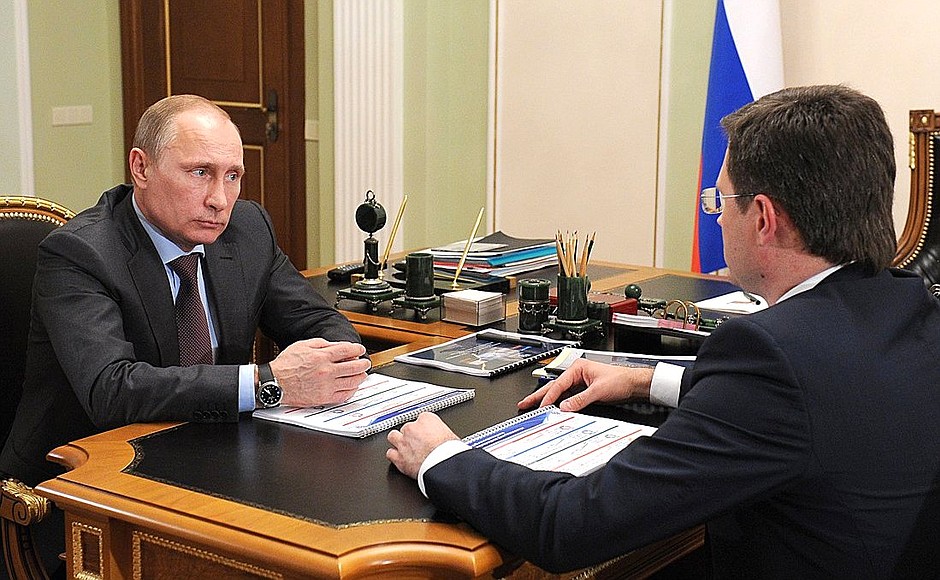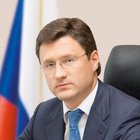Mr Novak briefed the President on the readiness of Sochi power facilities for operation. Vladimir Putin instructed the Minister to get the operation of the city’s entire power grid under strict control.
* * *
President of Russia Vladimir Putin: Mr Novak, let us discuss the industry’s performance. In addition, I have a few specific questions.
Energy Minister Alexander Novak: Mr President, I would like to begin, if I may, by briefing you on the work to prepare energy facilities for the Olympic Games and to maintain a reliable power supply in the Sochi region.
Vladimir Putin: That is exactly what I would like to talk about as well. There are still some open issues there.
Alexander Novak: Let me summarise what we have done. Generally speaking, 49 major energy facilities were to be commissioned in line with the programme to prepare the Olympic facilities and maintain reliable power supply in the Sochi area. To date 48 facilities are in operation.
These are large new facilities. Two major power stations have been built – in Dzhubga and Adler; two stations have been modernised and nine mobile gas turbine power stations have been commissioned. These 202-megawatt stations were delivered specifically for Sochi. In total, we have increased power generation in the Sochi area 8-fold: the Sochi region used to have just 140 megawatts before the Olympics, and now the figure is 1,099 megawatts.
Vladimir Putin: We have to make sure it all works.
Alexander Novak: Mr President, it is all working already, these facilities have already been commissioned.
Next, we have the electrical substations that distribute the overall load. We have commissioned 20 220- and 110-kilovolt stations, and 22 major power lines.
Only one facility remains to be commissioned, and construction and assembly work has already been completed there. This is the Sochi power distribution network – a major facility consisting of a number of smaller units. It is made up of almost 900 kilometres of aerial cable lines and over 500 electrical substations, small transformer units that operate as low voltage distribution valves (for consumers).
All this work has been completed, and we are now in the process of transferring power from the old electrical substations to the new ones. We plan to complete this by January 20 and have the final commissioning permit by January 25. This is the only unit we are still working on.
In addition, our major task for the remaining month is to prepare relevant facilities for operation. This work is already underway, of course, and we are on the final stretch now. A single power supply control centre has been operating round the clock since September. It involves representatives of the operator’s systems, Russian Railways, all power supply organisations, the Federal Grid Company of Unified Energy System, Russian Grids, and the Energy Ministry. Thus, we are monitoring the system 24 hours a day and promptly react to all situations that arise, including the need to provide reserve power supply.
We have mobilised additional personnel to meet these goals, more than doubling the contingent and number of people located on-site and monitoring the situation 24 hours a day. We have added 560 units of equipment. We have purchased an additional 227 diesel generating units, which will provide reserve energy supplies above the figure I stated for stationary power installations. Should it become necessary, we can rely on these diesel generators to provide back-up power.
But I want to emphasise that we are ensuring energy security in accordance with the facilities’ construction design, which stipulates a triple back-up system.
Vladimir Putin: Mr Novak, we now need to approach this as carefully as possible in order to fine-tune everything, so that everything functions flawlessly. In addition to all the necessary wiring work, it is essential to train the staff so that people understand what they must do, and how. If the main sources suddenly get disconnected for any reason, the back-up generators must immediately turn on automatically; we need for all of this to be automated.
Alexander Novak: Mr President, this work is underway, and we are certainly working with staff members who are not employed by the power networks and generation stations – with the owners of the Olympic facilities, hotels and other facilities located in Krasnaya Polyana and the Imereti Valley. We are teaching them to train their staff and are also providing our own personnel – in other words, essentially, leasing out professionals, in order for them to work on location.
Vladimir Putin: Some hotel facilities there have not been completed yet, and it is absolutely imperative to ensure that the energy specialists and builders work side by side, so there are no setbacks due to poor coordination between them. Be sure to monitor this.
Alexander Novak: Certainly, Mr President.
With regard to fuel and energy complex facilities, I would like to say that this year, we are observing positive momentum in the oil and gas sector based on the main indicators and energy resources. The volume of oil production in Russia was 523.2 million tonnes in 2013, which is 4.5 million tonnes more than in 2012.
Vladimir Putin: We hit a record last year.
Alexander Novak: Indeed, we have reached record-high indicators last year, ones that have not been seen since the 1990s. Overall, we were not planning for this volume, since according to our socioeconomic development forecast, the volume of oil produced was planned at a level of 505–510 million tonnes.
Nevertheless, we have been increasing production by approximately 5 million tonnes every year, and this is thanks in part to your decisions and the amendments made in 2013 to tax legislation, stimulating the development of new oil deposits and stranded oil reserves.
Moreover, an important new step has been taken: legislative amendments were passed last year that will allow us to develop offshore oilfields in the future.
Vladimir Putin: So you feel these measures have produced the desired effect?
Alexander Novak: They certainly have, and this has provided the opportunity to bring three more oil deposits into production this year, including the Prirazlomnoye field in Eastern Siberia, where Gazpromneft has launched an offshore field in Russia for the first time.
In addition, in 2013, production began at the Trebs and Titov oil fields, and there was an increase in production at fields in Eastern Siberia that were under commissioning; Vankorskoye field was among those that posted strong growth.
So we are seeing an increase in production mainly due to growth in the east and north, despite the certain risks that currently exist in Western Siberia pertaining to the extraction volume stagnation, since these are aging fields; many of them were launched in the 1960s.
However, the decisions made on stranded oil reserves provide the option to further increase the coefficient of oil extraction and develop new deposits, such as Bazhenovskoye and Achimovskoye.
According to expert assessments, these changes provided the opportunity to further engage nearly 8 billion tonnes of oil in profitable development; in other words, there was an increase from 12 to 20 billion tonnes.
Vladimir Putin: This is good information, since it’s true that three or four years ago, we felt it was over and we could not expect any further increases; but we achieved this nevertheless. Good.
Alexander Novak: Mr President, I think we are still to see the full benefits of these measures, since they do not have a very rapid effect, and we will reach even higher indicators in the medium term.
Overall, I want to say there are still many key indicators in the oil sector that, in my view, show a positive trend, including refining. In 2013, 278 million tonnes of oil were refined; this is also a historical high with a 3% increase.
Vladimir Putin: The Government’s decision on crude oil and petroleum derivatives, as well as the export tax – how well do you feel it is working? Might it stimulate the export of crude oil to the detriment of refining within the country?
Alexander Novak: This step was part of a comprehensive solution based on the need to maintain the investment appeal of oil companies, including those engaged in extraction and refining.
Because a decision was made to lower the export duties on oil, another decision was made simultaneously to lower export duties for petroleum derivatives, particularly diesel fuel. This provides the opportunity for increasing the profits from oil refining and encourages investment in this sector.
I want to cite a figure, the amount that was invested into oil refining in 2013: 269 billion rubles [over $8 billion]. For comparison, the figure for 2012 was 178 billion rubles; in other words, this is an increase of nearly 50%. Thirteen new deep conversion facilities were launched.
Vladimir Putin: But this is under the conditions of the previous taxation and export duty system. In any case, Mr Novak, as head of a key ministry, you will need to monitor the practice of implementing these decisions, concerning import customs tariffs and taxation to understand how this is working in practice.
And I believe there are new indicators for gas as well?
Alexander Novak: That’s right. Last year, gas output increased by nearly 13 billion cubic metres compared to 2012, and stands at 668 billion cubic metres of gas. That amounts to a 2% increase on 2012. At the same time, I particularly wanted to note that gas exports have grown by nearly 10% and amounted to at 206 billion cubic metres.
Vladimir Putin: What do you expect from the decisions taken by the Government on liquefied natural gas, and the decisions concerning liberalisation in this area?
Alexander Novak: I believe this was one of the key decisions made in 2013. This measure was developed in part following your instructions, taking into account the analysis of global markets, liquefied natural gas markets and gas supply.
I feel that it will provide additional incentives for increasing the volume of investments specifically for processing gas, supplying it to markets, and the ability to conquer additional niches, particularly in the Asia-Pacific region.
Let me name a few figures. Currently, the share of liquefied natural gas in total gas trade volume throughout the world has increased from 18% to 32%. Today, we are only supplying about 11 million tonnes from the Sakhalin-2 plant to global markets, but the decisions taken will allow us to increase that volume to 30–35 million tonnes by 2018 or 2020. In other words, we will be able to triple our supply to global markets.
Vladimir Putin: Up to 10%?
Alexander Novak: Yes, that is about 10% overall. The rate of LNG consumption will grow more quickly than for natural gas. So we will certainly create all the conditions for these projects to be implemented. These include new highly-skilled jobs and new technologies, new taxes, and the overall development of territories in the east and north of the country.
Vladimir Putin: We just need to ensure that investments from private companies are synchronised with state investments into the very infrastructure whose construction is the government’s responsibility. Please be sure to monitor this very carefully.
Alexander Novak: This will be one of our main objectives for this year. This pertains to the gas sector, the oil sector, new oil refineries and new petrochemical projects.
Incidentally, I would also like to note that in 2013, with the implementation of four new facilities for polymer production (you also attended the opening of these plants), we were able to reduce import of the relevant products by nearly 40%.
In other words, we used to buy about 1.4 million tonnes of the relevant products. Because Russia is now launching its own production sites, we have already reduced purchases to 1 billion tonnes. By 2017, our own plants should be able to meet the domestic market demand in full.
Vladimir Putin: We also need to ensure continued modernisation of oil refineries. Companies have major programmes and we need to do everything for these programmes to be carried out.
Alexander Novak: Mr President, this work will certainly continue. As of today, 13 new facilities have been commissioned and 31 plants have been modernised; therefore we will still need to complete work on 100 facilities in the next three years. We will monitor this and ensure that our plans are fulfilled.
Vladimir Putin: Good. Thank you.
<…>


